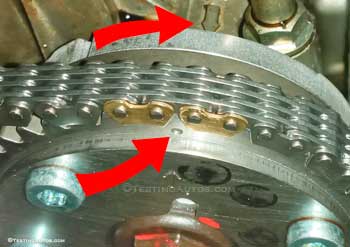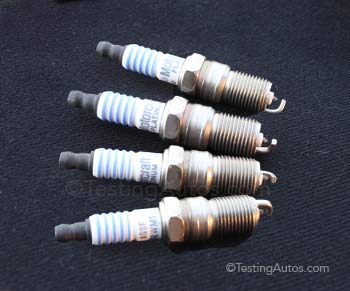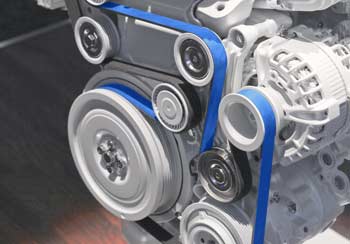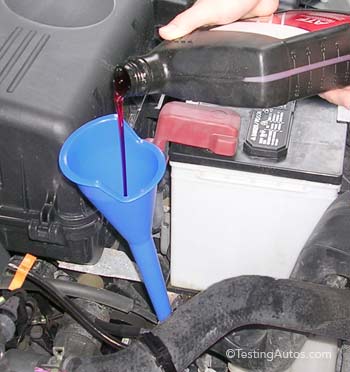When does the timing chain need to be replaced?
By Vlad Samarin Updated December 3, 2023
When it comes to your car's timing chain, the rule is simple: it doesn't need replacing unless it's causing trouble. But, like any mechanical part, it's not immune to wear and tear. High-mileage vehicles are particularly susceptible to timing chain issues. From our experience, a timing chain is usually replaced after 120,000-150,000 miles. In some cars, the timing chain can last the lifetime of the vehicle, but in others, it's known to wear out sooner. Lack of regular oil changes, low oil levels, or poor oil quality can accelerate the wear and stretching of the timing chain.
Keep an eye out for signs like a sluggish engine, reduced power, difficulty starting, or the Check Engine light coming on. Unusual noises, ranging from rattling to whirring, may also signal a worn timing chain, guides, or tensioner.
If you suspect a worn timing chain, it's advisable to replace it as a kit, including a new tensioner, guides and possibly cam gears. Prices for replacement can vary, ranging from $370 to $1,500, depending on the vehicle model. And remember, if you plan to tackle the replacement yourself, consult your vehicle's service manual for the correct procedures.
How the timing chain works:
The timing chain synchronizes rotation of the engine's crankshaft with the camshaft(s). The camshaft(s) rotate at half the speed of the crankshaft in order to open the intake and exhaust valves at the right timing of the piston movement.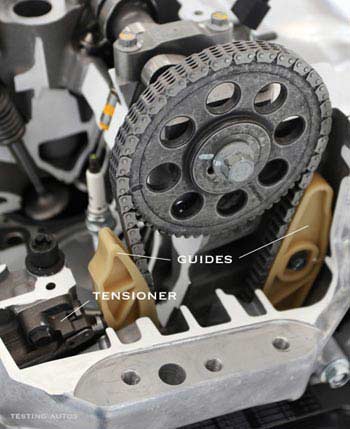 Timing chain, tensioner and chain guides. See timing chain animation.
Timing chain, tensioner and chain guides. See timing chain animation.Your car's timing chain, a crucial component in the engine, operates always lubricated by engine oil. A lack of proper maintenance, including infrequent oil changes, low oil levels, or poor oil quality, can accelerate the wear and stretching of the timing chain.
The timing chain is kept under proper tension by a chain tensioner. The tensioner could be operated by a spring-loaded mechanism and/or oil pressure. Additionally, chain guides and silencers prevent excessive vibration. Over time, these components wear out too, contributing to timing chain issues.
Symptoms of a worn timing chain include engine sluggishness, reduced power, difficulty starting, and the illumination of the Check Engine light. The scan of the Check Engine light often reveals the code P0341 - Camshaft Position Sensor Circuit Range/Performance. This code is a common sign that the timing chain is stretched or has skipped a tooth.
Advertisement
Unusual noises, emanating from rattling to whirring, can be also indicative of timing chain problems. The noise typically comes from the area of the timing chain cover. As the chain wears, ignition and valve timing become more retarded, affecting the overall performance of the engine.
If you decide to replace a worn timing chain, it's recommended to do so as a complete kit, including a new tensioner, guides, and other essential parts of the chain drive mechanism. Some vehicles have multiple chains, and it might be advised to replace all of them simultaneously. If money is tight, replacing only the chain and the tensioner may be sufficient to get the engine running in some cases; consult with your mechanic.
Prices for timing chain replacement can vary widely based on the vehicle model, ranging from $370 to $1,500. If you're considering a DIY approach, consult your vehicle's service manual for the precise timing procedures. Replacing a timing chain is a very precise job. For an average car, we would rate the difficulty of this job at 7 on the scale from 1 to 10, with 10 being the most difficult. The key is to set the timing correctly.
In many cars, the new timing chain has colored links that need to be lined up with the timing marks on the crank and cam gears. This photo, for example, shows the colored chain links lined up with the timing marks on the Honda K24 engine.
What will happen if you continue driving with a worn-out timing chain and /or tensioner? We have seen many cars where a worn-out timing chain skipped one or even several teeth. This can result is a very sluggish engine or in worst cases, the damage to the pistons and valves. For example, some older VW or Audi 2.0-liter TFSI engines are known for the possibility of getting severely damaged as a result of a bad chain tensioner/chain.
To preempt timing chain issues, prioritize proper engine maintenance. Regular oil changes at recommended intervals, coupled with premium-quality engine oils and filters, can significantly extend the life of your timing chain. Maintaining the right oil level is particularly crucial, especially in modern engines that may consume oil. With diligent care, a well-maintained timing chain can endure up to 300,000 miles or even longer.

